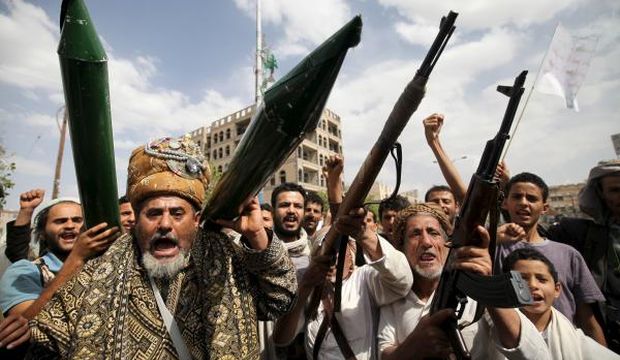
Houthi followers hold mock missiles and their rifles as they shout slogans during a demonstration against the United Nations in Sana’a, Yemen, on July 5, 2015. (Reuters/Mohamed Al-Sayaghi)
Riyadh and Sana’a, Asharq Al-Awsat—Yemen’s internationally recognized government and members of the Saudi-led coalition targeting the Houthis in Yemen have begun consultations with the UN regarding a proposed ceasefire in the country, according to a Yemeni government spokesman.
Speaking to Asharq Al-Awsat on Monday, Rajeh Badi said talks were underway between the UN and Yemen’s government, headed by President Abd Rabbuh Mansur Hadi and Prime Minister and Vice President Khaled Bahah, as well as the leaders of countries involved in the aerial campaign against the Houthis.
Badi said the proposed ceasefire would last until the end of the Muslim festival of Eid, which begins after July 17, and should be announced within the coming days.
The Yemeni government remains committed UN Security Resolution 2216 which demands the Houthis vacate all areas of the country currently under their control, Badi said.
As part of the current discussions, the government wants guarantees the Houthis will vacate four areas—Aden, Lahj, Taiz, and Al-Dalea—and hand over control of the country’s ports to authorities in Aden.
The government will also stick to Article 9 of the resolution, which stipulates allowing aid to be delivered to all Yemen’s cities and provinces. As another condition for the ceasefire, the government wants guarantees the Houthis will comply with Article 9.
Several sources, including those working for regional and international NGOs, have told Asharq Al-Awsat in recent weeks that the Shi’ite group has been blocking their entry into Yemen and stopping supplies from reaching those most in need.
Badi revealed the UN is currently in the process of forming a committee that will oversee the Houthis’ compliance with the terms of the ceasefire if an agreement is reached.
A five-day humanitarian ceasefire was offered in May to the Houthis by the Saudi-led coalition, with both sides agreeing to its conditions. However, the ceasefire did not hold and airstrikes by the coalition restarted due to the Houthis continuing to target civilians in the country—breaking one of the main conditions of the ceasefire.
This comes as UN Envoy to Yemen Ismail Ould Cheikh Ahmed visits Sana’a to hold talks with the Houthis—one of several over the past month—and senior members of the ruling General People’s Congress (GPC) party.
The GPC is headed by ex-president Ali Abdullah Saleh, who has been accused by Yemen’s government, Saudi Arabia, and the UN of aiding the Houthis in the country since their takeover of Sana’a in September.
A Yemeni political source told Asharq Al-Awsat these talks were now “close to securing an agreement to the ceasefire” from the Houthis, Saleh, and the rest of the GPC leadership.
Adel Al-Shoja’, a member of the GPC’s politburo, echoed this optimism regarding an agreement being reached.
He told Asharq Al-Awsat on Monday the talks had been wide-ranging, with “the UN talking today about a humanitarian ceasefire, while the GPC is talking about stopping the fighting permanently before holding talks with other parties and political factions.”
“Without these talks with other factions, the ceasefire will become a mere temporary break, and the fighting will eventually restart,” he said.
Shoja’ insisted his party was committed to the talks and was “cooperating fully” with Ould Cheikh Ahmed and the UN.
He said the GPC was now seeking a “substantive political solution” to Yemen’s crisis through the talks.
After overrunning Sana’a last September—allegedly aided by members of the police and security services in the city still loyal to former president Saleh—the Houthis launched a coup in February of this year, holding President Hadi and other members of his cabinet including Bahah under house arrest.
Hadi eventually fled to Riyadh where he requested Saudi Arabia and its allies intervene in the country in order to restore political legitimacy. The Saudi-led aerial campaign targeting the group began in late March.
Arafat Madabish contributed additional reporting from Sana’a.
